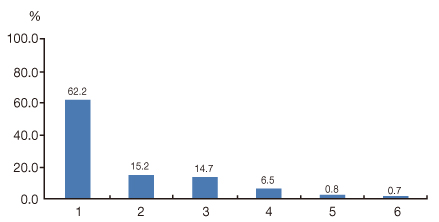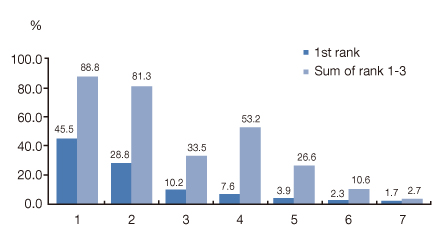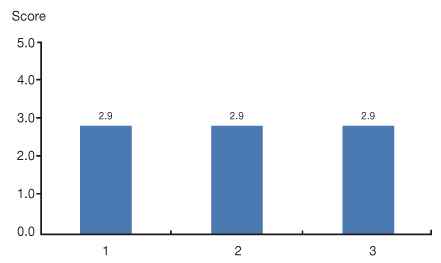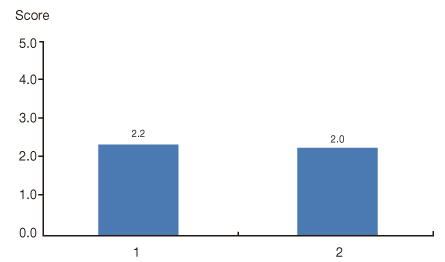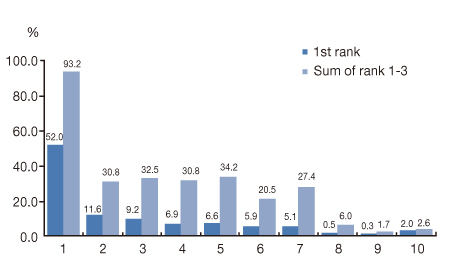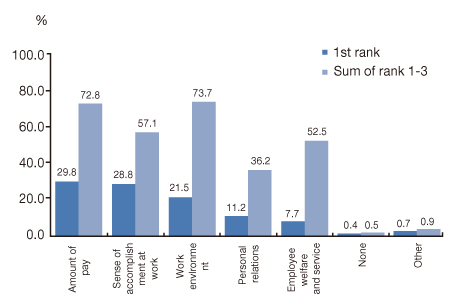J Korean Med Assoc.
2012 Jan;55(1):56-73.
A study on the current state of public health doctors
- Affiliations
-
- 1Research Institute of Healthcare Policy, Korean Medical Association, Seoul, Korea. parky@sch.ac.kr
- 2Korean Association of Public Health Doctor, Seoul, Korea.
- 3Department of Preventive Medicine, Soonchunhyang University College of Medicine, Cheonan, Korea.
Abstract
- As the healthcare environment has changed both socially and politically importance of public health doctors' roles has increased and ongoing revision of their roles is also needed in Korea. However, many problems have decreased the job satisfaction of public health doctors. This study aims to determine the factors that influence public health doctors' satisfaction. The survey was conducted over the course of 2 months by questionnaire methodology. A total of 881 respondents (response rate, 90.1%) participated and 778 valid responses were analyzed using SAS version 9.1. Items about arranged organization, work task, employee welfare and services, education, public health doctor's system, and the role of public health doctors were included in the questionnaire. It was found that the satisfaction of many respondents was not high and they had negative perceptions of arranged organization, work, environment, employee welfare and services, education, system, and their own role. Although the public health doctors have professional knowledge of healthcare, they were not satisfied with their role because they were required to do inappropriate work, improperly arranged and found performing work difficult when treated unfairly or not paid fairly. Therefore, policies focused on financial compensation or system improvement must be established to increase the satisfaction of public health doctors. This study's limitation was that the survey was done through two modalities. However, it is meaningful that issues related to the public health doctors were dealt with more comprehen-sively in this study than other studies.
MeSH Terms
Figure
Reference
-
1. Article 1-2, Act No. 10653. Act on special measures for the health and medical service in the areas including farming and fishing villages. 2011. 05. 19.2. Yoon SJ. A study on the branch of public health center's status and approaches for reorganization. 1998. In : The 20th anniversary symposium of Korean Association for Public Health Doctor; Seoul: Korean Association for Public Health Doctor.3. Yi JR. Study on public health doctors: job satisfaction rate and demand for changes [dissertation]. 2000. Seoul: Yonsei University.4. Song HS. The system of public health doctors and family doctor. J Korean Acad Fam Med. 2000. 21:S296–S299.5. Jeong HJ, Jo HS, Bae SS. A study on job satisfaction and strategies to improve the system of public health doctors in charge of community health programmes. Korean J Health Policy Adm. 2004. 14:1–23.6. Kim SY, Kang YH, Lee SJ, Hwang JY, Kang HT, Han IH. Establishment of disposition standards for the appropriate disposition of public health doctors. 2009. Cheongwon: Korea Health Industry Development Institute.7. Kang HS. A study on improvement methods of public doctor system in public health institution [dissertation]. 2004. Anseong: Hankyong National University.8. Kim ES, Han GC, Lee DH. A study on the current utility and policy task of public health doctors' manpower in branch of public health center. 1996. Seoul: Korea Institute for Health and Social Affairs.9. Moon JJ, Kim CW, Lee JH, Seo JW, Kim DH, Song EC, Lee JW. A study on development of assessment tool and strategies to improve the arrange system for public health doctors. 2005. Cheongwon: Korea Health Industry Development Institute.10. Moon JJ, Seo JW, Seon JH, Nam HJ, Park HG. A study on the utilization of manpower for efficient management of public health services. 2007. Cheongwon: Korea Health Industry Development Institute.11. Kim YI, Kim CB, Yoon SJ, Kim JY, Choi BY. A study on the strategies to improve system for public health doctor system. 2002. Seoul: Presidential Commission on Policy Planning.
- Full Text Links
- Actions
-
Cited
- CITED
-
- Close
- Share
- Similar articles
-
- Doctors as Public Goods: Understanding Meaning and Precious Values
- A Hidden Key to COVID-19 Management in Korea: Public Health Doctors
- Shortage of public healthcare personnel, is it a problem of number of doctors?
- Problems and Reconsideration of the Concept of Public Health Care (Public Health and Medical Services) in South Korea
- Do We Really Need More Medical Schools or Doctors in Korea?

